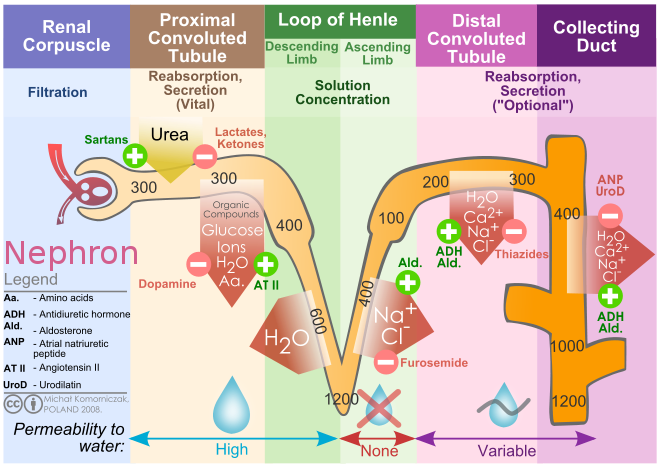The endocrine system consist of ductless glands that produce hormones. These hormones take part in a different chemical reaction and it is normally used in low concentration.
Both ADH and Aldosterone are some of the hormones produced by these ductless glands. They may sound similar but they tend to be quite different.
The article provides the core difference between ADH and aldosterone in tabular form for easier comprehension. Take the time to read through slowly.

What Is ADH?
ADH stands for Anti-diuretic Hormone which is also known as Vasopressin, arginine vasopressin (AVP) or argipressin.
The hormone comes from hypothalamus part of the brain and the posterior pituitary gland is responsible for their release.
The core function of the hormone is ensuring various body metabolic activities take place. It is a protein in nature and contains several amino acids such as tyrosine, phenylalanine, glutamine, asparagine, proline, arginine, glycine, and cysteine.
What Is Aldosterone?
Aldosterone is a mineralocorticoid steroidal hormone which is made up of cholesterol. The hormone is secreted by the adrenal gland from the adrenal cortex.
The core function of aldosterone is to enhance the absorption of sodium by the nephron to regulate water and salt balance.
Comparison Chart: ADH Vs Aldosterone
| Basic Terms | ADH | Aldosterone |
| Meaning | It is a peptide hormone secreted by the pituitary gland | It is a corticosteroid hormone that facilitates the absorption of sodium by the nephron to regulate water and salt balance. |
| Type of Hormone | Peptide hormone. | Steroid hormone |
| Secretion | Synthesized in the hypothalamus and secreted by the posterior pituitary gland | Synthesized and secreted by the adrenal cortex |
| Core Role | Makes the DCT and collecting tubules more permeable to water | Makes the DCT and collecting tubules more permeable to sodium ions |
| Importance | Directly increases the water reabsorption from the tubules | Increases the water reabsorption by creating an osmotic pressure |
| Blood Vessels Effect | Increases the blood pressure through vasoconstriction | No effect on the blood vessels |
| Release | Released in response to hypertonicity of the blood | Released in response to the increased plasma angiotensin III, serum potassium concentrations, stimulation of the stretch receptors in the atria, etc. |
| Inhibitors | Alcohol | Angiotensin-converting enzyme, dopamine, and atrial natriuretic hormone |
Core Differences
- Aldosterone is made in the adrenal cortex while ADH synthesized in the hypothalamus.
- ADH helps to conserve water directly through its reabsorption whereas Aldosterone through indirectly through the reabsorption of sodium.
- The blood vessel effect upon release of ADH is vasoconstriction while aldosterone has no effect.
- ADH helps to increase reabsorption of water from tubules while Aldosterone increases water reabsorption by creating an osmotic pressure.
Core Similarities
- Both increases water reabsorption in the nephron
- Both are secreted under low pressure
- Both increase blood pressure by producing concentrated urine
Comparison Video
Conclusion
The core similarities between ADH and aldosterone is that they increase the reabsorption of water in the nephron.
Understanding the core difference between ADH and aldosterone will help to differentiate how these two hormone function.
You May Also Like
- Cellular Respiration Vs Photosynthesis
- Cation Vs Anion
- Carbon Dioxide Vs Carbon Monoxide
- C3 VS C4 VS CAM
- Bone vs Cartilage